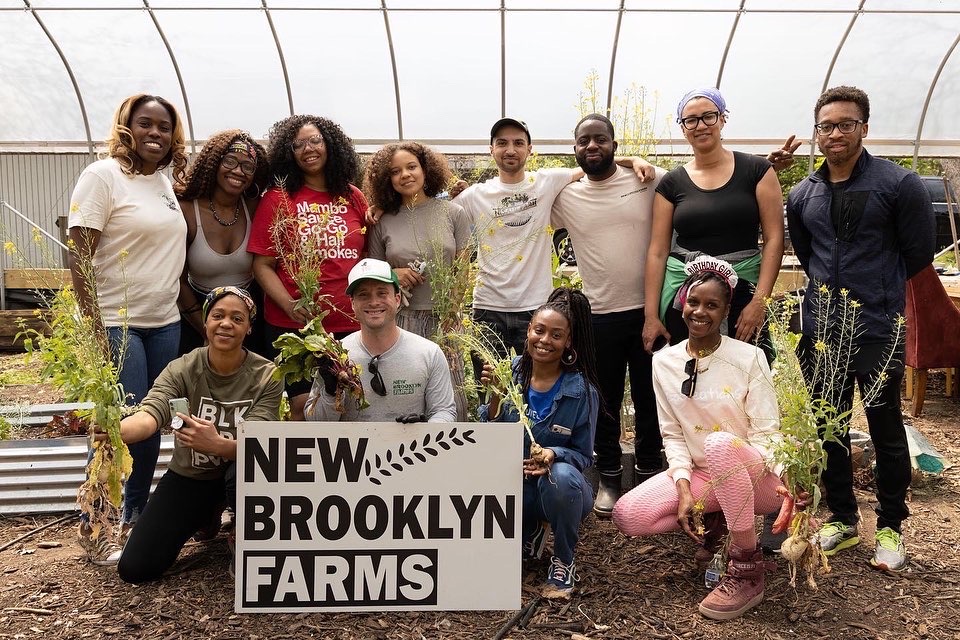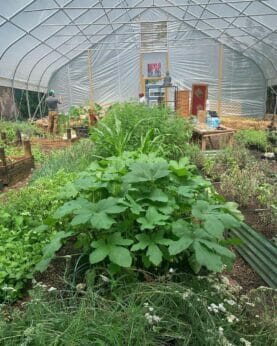Zoning laws can often be barriers for new farmers, but cities and towns are slowly making it easier to farm in residential areas.

When a vacant lot next to Doug Adams’ childhood home in Prince George’s County, Maryland came on the market in 2016, he jumped at the chance to buy it.
“It was a unique property and I didn’t really have a plan when I bought it, but I decided I didn’t want to build a house on it,” says Adams. “In thinking about what else I could do that was productive, I decided I’d take a shot at growing food.”
Adams quickly developed a plan to host farmers in residence, grow specialty crops for local brewers and host events on the small quarter-acre property he named New Brooklyn Farms. He connected with Prince George’s Soil Conservation District and eventually received USDA funding to build a greenhouse on the property.
That’s when he hit a roadblock. “I was trying to do things correctly and went to get a permit for the greenhouse and was told, ‘You can’t build a greenhouse, it’s not inline with the code, and you can’t operate a farm business, the property isn’t zoned for that,'” says Adams.
Urban farms, like New Brooklyn Farms, have sprouted up in vacant lots across the country since at least the 1990s, when urban farming started to go through a renaissance. In the decades since, many communities have reaped the benefits of having farms in traditionally residential areas—including increased access to fresh foods, carbon sequestration and even workforce training and community building—but many zoning laws haven’t kept up with the increased demand for urban farming.
“Zoning initially was created to separate uses, to separate residential from agriculture, and it was all to promote public health and safety initially, but now I think people are beginning to see that it’s not really worked to further our communities,” says Lihlani Nelson, deputy director at Center for Agriculture and Food Systems (CAFS) at Vermont Law and Graduate School, which helped to create the Healthy Food Policy Project.
Five years ago, CAFS, the Public Health Law Center (PHLC) and the Rudd Center for Food Policy and Health at the University of Connecticut came together to create a policy database to give local governments examples of policies that best work to increase access to healthy food. They quickly realized that zoning laws could have a significant impact on improving access to healthy food.
“People have been doing what we’re calling urban ag for a very long time,” says Nelson. “It’s not some brand new thing, but there has been such a growth in the movement around urban ag and there’s so many benefits that people understand in terms of health, environment and community, that it seems like a no-brainer to try to support it as much as possible through local policy, including zoning.”

Inside New Brooklyn Farms’s greenhouse. (Photo courtesy New Brookly Farms)
When Adams realized he couldn’t build his greenhouse, he started rallying local support.
“I thought, ‘Wow I got this money to spend and I can’t build,” says Adams.
He wrote to the mayor and the town council, worked to get support from different community organizations and eventually connected with a county council member that was pro-urban farming. For Adams and others who have worked to change zoning codes, gathering supporters has been the key to easing zoning restrictions.
In Kansas City, Missouri, a farmer from the former urban farm Bad Seed Farm got Cultivate KC involved early in their zoning fight. The organization helps growers develop skills and access resources to start and maintain sustainable farm businesses.
“They were operating a CSA out of a backyard farm in a residential neighborhood and they started running into some issues with the city around running a business in a residential neighborhood,” says Ami Freeberg, Cultivate KC’s assistant director of strategy and partnerships.
In 2009 and 2010, Cultivate KC worked with the farmer and other community organizations on what ended up being an extensive process full of community meetings, meetings with city council members and members of the zoning department to come up with ordinances that eventually allowed for Bad Seed Farm and other urban farms to operate.
“It was a big step forward at the time because it made it possible and created a pathway for farm businesses to operate in residential areas, but there are still a lot of particulars around requiring special use permits, limiting onsite sales and specific restrictions around CSAs, separate from other types of urban agriculture,” says Freeberg.
In the 13 years since, the ordinance has made Cultivate KC’s work more straightforward in the sense that there are codes for them to point people towards, but the reception or the ordinance and urban farms in general has varied greatly by neighborhood and individual community member.
“There’s one neighborhood in particular that had a proliferation of urban farms after the ordinance passed,” says Brien Darby, executive director of Cultivate KC. “And even within that neighborhood, it depends on who you talk to, but some folks are all for it. They like it as an identity for the neighborhood. And some folks are like, ‘We do not want any more green infrastructure going on in our neighborhood.’”
Cultivate KC does expect that it will need to collaborate with the city to revisit the ordinance in the next few years.
“There’s still a lot of gray areas in the language. We get questions every few months,” says Freeberg, adding that one of the initial things Cultivate KC worked on was putting together training for code enforcement, which they’d like to do again.
They also hope to work with officials in Wyandotte County, which oversees zoning for Kansas City, Kansas, on updating their codes to make urban agriculture more accessible.
It took Adams two years and a lot of campaigning to receive a special planning resolution to permit his farm in Prince George’s County. The county also used it as an opportunity to expand zoning for urban farming.
Adams advises that others going through the process try to speak to as many people as possible within their zoning department. Getting in touch with politicians to get their support can be a worthwhile challenge, he says, noting that he leveraged community organizations to get in touch with politicians. “You have to put yourself out there, collect signatures and use social [media] and the press to keep the eyes on and give people more reason to help you.”
Everyone should have the right to have a garden/small farm on their property, and cities with the available space should encourage the development of urban farms. Much better than having that land producing nothing.